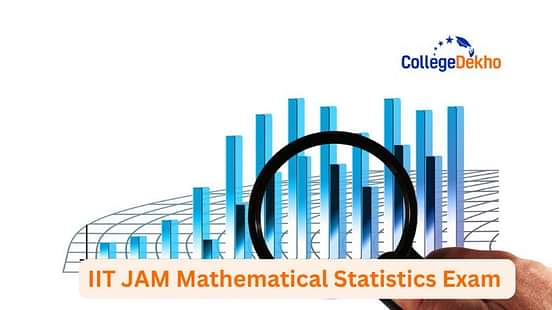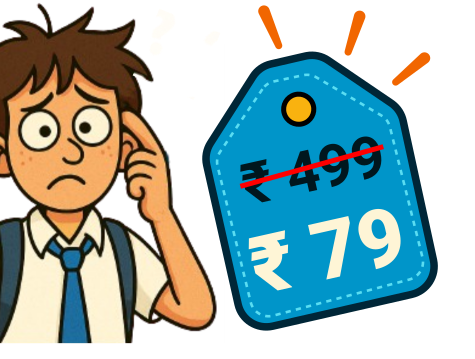- IIT JAM 2025 Mathematical Statistics Dates
- IIT JAM Mathematical Statistics 2025 Syllabus: Mathematics
- IIT JAM Mathematical Statistics 2025 Syllabus: Statistics
- IIT JAM Mathematical Statistics Previous Question Papers
- Books to Prepare for IIT JAM Mathematical Statistics 2025
- IIT JAM Mathematical Statistics Cutoff
- Faqs

IIT JAM Mathematical Statistics 2025: In the Mathematical Stats paper of IIT JAM 2025, 30% weightage will be carried by mathematical concepts while 70% questions will be from the statistical portion . To score well in IIT JAM mathematical statistics exam 2025, your analytical skills and knowledge across topics like probability, type of distributions, etc must be strong enough. Practice is the key to crack this challenging entrance. We highly recommend getting a good grasp over important theorems, stochastic processes and some fundamental key concepts. You can refer to IIT JAM previous year question papers that can give much needed guidance on repetitive topics, level of paper, marking scheme and sectional division.
As per schedule shared by IIT Delhi, IIT JAM Mathematical Statistics(MS) 2025 exam will be held on February 2, 2025 in the afternoon session. Successful students can get a golden chance to pave the way for enhancing their subject skills under the mentorship of eminent faculties of reputed IITs. Some of the popular courses one can pursue through IIT JAM 2025 MS paper include MSc in Mathematical Stats or integrated PhD in Operations Research.
Continue reading this article and gain complete insight into IIT JAM Mathematical Statistics 2025 exam date, syllabus, previous year questions and recommended books.
IIT JAM 2025 Mathematical Statistics Dates
Candidates can check out all the IIT JAM Mathematical Statistics 2025 important dates in the table provided below:
Events | Dates |
|---|---|
Commencement of IIT JAM 2025 Registration and Application form | September 3, 2024 |
| IIT JAM Application Form 2025 Last Date | October 11, 2024 |
| IIT JAM 2025 Application Form Correction | November 18, 2024 |
| Upload of valid OBC-NCL certificate | November 20, 2024 |
IIT JAM 2025 Admit Card Download Date | January 6, 2025 |
IIT JAM 2025 Exam Date | February 2, 2025 |
IIT JAM 2025 Exam Result Date | March 19, 2025 |
| IIT JAM 2025 Score Card | March 25, 2025 |
Starting date of IIT JAM 2025 Application Form for Admission | April 2025 |
IIT JAM Mathematical Statistics 2025 Syllabus: Mathematics
IIT JAM Mathematics Statistics syllabus 2025 is provided below:
Topics | Sub-topics |
|---|---|
Sequences and Series of real numbers: | Sequences of real numbers, their convergence, and limits. Cauchy sequences and their convergence. Monotonic sequences and their limits. Limits of standard sequences. Infinite series and its convergence, and divergence. Convergence of series with non-negative terms. Tests for convergence and divergence of a series. Comparison test, limit comparison test, D’Alembert’s ratio test, Cauchy’s nth root test, Cauchy’s condensation test and integral test. Absolute convergence of series. Leibnitz’s test for the convergence of alternating series. Conditional convergence. Convergence of power series and radius of convergence. |
Integral Calculus | Fundamental theorems of integral calculus (single integral). Lebnitz's rule and its applications. Differentiation under integral sign. Improper integrals. Beta and Gamma integrals: properties and relationship between them. Double integrals. Change of order of integration. Transformation of variables. Applications of definite integrals. Arc lengths, areas and volumes. |
Differential Calculus of one and two real variables | Limits of functions of one real variable. Continuity and differentiability of functions of one real variable. Properties of continuous and differentiable functions of one real variable. Rolle's theorem and Lagrange's mean value theorems. Higher order derivatives, Lebnitz's rule and its applications. Taylor's theorem with Lagrange's and Cauchy's form of remainders. Taylor's and Maclaurin's series of standard functions. Indeterminate forms and L' Hospital's rule. Maxima and minima of functions of one real variable, critical points, local maxima and minima, global maxima and minima, and point of inflection. Limits of functions of two real variables. Continuity and differentiability of functions of two real variables. Properties of continuous and differentiable functions of two real variables. Partial differentiation and total differentiation. Lebnitz's rule for successive differentiation. Maxima and minima of functions of two real variables. Critical points, Hessian matrix, and saddle points. Constrained optimization techniques (with Lagrange multiplier). |
Matrices and Determinants: | Vector spaces with real fields. Subspaces and sum of subspaces. Span of a set. Linear dependence and independence. Dimension and basis. Algebra of matrices. Standard matrices (Symmetric and Skew Symmetric matrices, Hermitian and Skew Hermitian matrices, Orthogonal and Unitary matrices, Idempotent and Nilpotent matrices). Definition, properties and applications of determinants. Evaluation of determinants using transformations. Determinant of product of matrices. Singular and non-singular matrices and their properties. Trace of a matrix. Adjoint and inverse of a matrix and related properties. Rank of a matrix, row-rank, column-rank, standard theorems on ranks, rank of the sum and the product of two matrices. Row reduction and echelon forms. Partitioning of matrices and simple properties. Consistent and inconsistent system of linear equations. Properties of solutions of systems of linear equations. Use of determinants in solution to the system of linear equations. Cramer’s rule. Characteristic roots and Characteristic vectors. Properties of characteristic roots and vectors. Cayley Hamilton theorem. |
IIT JAM Mathematical Statistics 2025 Syllabus: Statistics
IIT JAM Mathematics Statistics syllabus has been given below:
Topics | Sub-topics |
|---|---|
Probability | Random Experiments. Sample Space and Algebra of Events (Event space). Relative frequency and Axiomatic definitions of probability. Properties of probability function. Addition theorem of probability function (inclusion-exclusion principle). Geometric probability. Boole's and Bonferroni's inequalities. Conditional probability and Multiplication rule. Theorem of total probability and Bayes’ theorem. Pairwise and mutual independence of events. |
Standard Univariate Distributions | Degenerate, Bernoulli, Binomial, Negative Binomial, Geometric, Poisson, Hypergeometric, Uniform, Exponential, Double exponential, Gamma, Beta (of first and second type), Normal and Cauchy distributions, their properties, interrelations, and limiting (approximation) cases. |
Univariate Distributions | Definition of random variables. Cumulative distribution function (c.d.f.) of a random variable. Discrete and Continuous random variables. Probability mass function (p.m.f.) and Probability density function (p.d.f.) of a random variable. Distribution (c.d.f., p.m.f., p.d.f.) of a function of a random variable using transformation of variable and Jacobian method. Mathematical expectation and moments. Mean, Median, Mode, Variance, Standard deviation, Coefficient of variation, Quantiles, Quartiles, Coefficient of Variation, and measures of Skewness and Kurtosis of a probability distribution. Moment generating function (m.g.f.), its properties and uniqueness. Markov and Chebyshev inequalities and their applications. |
Multivariate Distributions | Definition of random vectors. Joint and marginal c.d.f.s of a random vector. Discrete and continuous type random vectors. Joint and marginal p.m.f., joint and marginal p.d.f.. Conditional c.d.f., conditional p.m.f. and conditional p.d.f.. Independence of random variables. Distribution of functions of random vectors using transformation of variables and Jacobian method. Mathematical expectation of functions of random vectors. Joint moments, Covariance and Correlation. Joint moment generating function and its properties. Uniqueness of joint m.g.f. and its applications. Conditional moments, conditional expectations and conditional variance. Additive properties of Binomial, Poisson, Negative Binomial, Gamma and Normal Distributions using their m.g.f.. |
Limit Theorems | Convergence in probability, convergence in distribution and their inter relations. Weak law of large numbers and Central Limit Theorem (i.i.d. case) and their applications. |
Standard Multivariate Distributions | Multinomial distribution as a generalisation of binomial distribution and its properties (moments, correlation, marginal distributions, additive property). Bivariate normal distribution, its marginal and conditional distributions and related properties. |
Sampling Distributions | Definitions of random sample, parameter and statistic. Sampling distribution of a statistic. Order Statistics: Definition and distribution of the rth order statistic (d.f. and p.d.f. for i.i.d. case for continuous distributions). Distribution (c.d.f., p.m.f., p.d.f.) of smallest and largest order statistics (i.i.d. case for discrete as well as continuous distributions). Central Chi-square distribution: Definition and derivation of p.d.f. of central χ2 distribution with n degrees of freedom (d.f.) using m.g.f.. Properties of central χ2 distribution, additive property and limiting form of central χ2 distribution. Central Student's t-distribution: Definition and derivation of p.d.f. Of Central Student's t-distribution with n d.f., Properties and limiting form of central t-distribution. Snedecor's Central F-distribution: Definition and derivation of p.d.f. of Snedecor's Central F-distribution with (m, n) d.f.. Properties of Central F-distribution, distribution of the reciprocal of F- F-distribution. Relationship between t, F and χ2 distributions. |
Testing of Hypotheses | Null and alternative hypotheses (simple and composite), Type-I and Type-II errors. Critical region. Level of significance, size and power of a test, p-value. Most powerful critical regions and most powerful (MP) tests. Uniformly most powerful (UMP) tests. Neyman Pearson Lemma (without proof) and its applications to construction of MP and UMP tests for parameters of single parameter parametric families. Likelihood ratio tests for parameters of univariate normal distribution. |
Estimation | Unbiasedness. Sufficiency of a statistic. Factorization theorem. Complete statistics. Consistency and relative efficiency of estimators. Uniformly Minimum variance unbiased estimator (UMVUE). Rao-Blackwell and Lehmann-Scheffe theorems and their applications. Cramer-Rao inequality and UMVUEs. Methods of Estimation: Method of moments, method of maximum likelihood, invariance of maximum likelihood estimators. Least squares estimation and its applications in simple linear regression models. Confidence intervals and confidence coefficient. Confidence intervals for the parameters of univariate normal, two independent normal, and exponential distributions. |
Students can also check : IIT JAM Mathematical Statistics 2025 Syllabus PDF
IIT JAM Mathematical Statistics Previous Question Papers
Students can check out the IIT JAM Mathematical Statistics previous year question papers from 2015-2023 in the table provided below:
Previous Year Question Papers | Answer Key |
|---|---|
-- | |
– | |
– | |
– | |
– |
Also Read: IIT JAM 2025 Exam Pattern
Books to Prepare for IIT JAM Mathematical Statistics 2025
Books, study materials and online coaching can build your confidence and conceptual clarity on IIT JAM Mathematical Statistics 2025 exam. We have provided a list of best books to prepare for MS paper efficiently.
Mathematical Stat Book Name | Author/Publication |
|---|---|
Fundamental of Mathematical Statistics | SC Gupta and VK Kapoor |
Complete Resource Manual MSc Mathematics | Suraj Singh |
Problems and Solutions in Mathematical Statistics | SC Gupta, Vikas Gupta and Sanjeev Kumar Gupta |
IIT JAM: MSc Mathematical Statistics | Anand Kumar |
Also Check: Best IIT JAM Coaching Institutes in India 2025
IIT JAM Mathematical Statistics Cutoff
IIT JAM cutoff varies each year based on the level of the questions, the total number of applicants, and the total number of seats. Knowing the cutoff marks is important because it will help you set your goals and plan your studies. IIT JAM Mathematical Statistics 2025 cutoff will be updated here as soon as it is released by IIT Delhi. Students can get an idea of the minimum marks by looking at the table below, which shows IIT JAM 2024 Mathematical Statistics cutoff.
Category | IIT JAM 2024 Physics Cutoff |
|---|---|
General | 23.03 |
EWS/OBC | 20.72 |
SC/ST/PWD | 11.51 |
Also Check:
IIT JAM 2025 Preparation Strategy, Tips, Study Plan, Timetable
It is not difficult to qualify for any entrance exam, such as the IIT JAM Exam. You can easily pass the exam with proper planning and strategy. Your chances of success will improve if you achieve a master's degree from IITs or IISC.
For more information and the latest updates on IIT JAM 2025 stay tuned with CollegeDekho.
Are you feeling lost and unsure about what career path to take after completing 12th standard?
Say goodbye to confusion and hello to a bright future!

FAQs
Students can expect topics such as fundamentals of a theorem of integral calculus, improper integrals, double integrals, and applications of definite integrals.
Some of the preparation tips include:
- Cover the high-weighage topics first
- Choose the right study material
- Attempt mock tests
- Solve Previous year's questions
Here is a list of some of the top linear Algebra books for IIT JAM Mathematical Statistics:
- Algebra by Artin
- Topics in Algebra by Herstein
- Linear Algebra Done Right by Axler
Yes, probability is an important topic in the IIT JAM statistics syllabus. Students need to prepare Boole’s and Bonferroni’s inequalities, multiplication rules and probability, Baye’s theorem, etc.
Was this article helpful?




















Similar Articles
TS DOST Admission 2025: Intra-College Phase (Started), Eligibility, Documents Required, Fee
CUET UG 2025 Login: Application Number, Password, Steps to Retrieve
AIFSET 2025: Registration (Live), Exam, Eligibility, Result, Admission Process
CSAS 2025 (Choice Filling - LIVE): DU Admission cum Counselling Process through CUET UG
Odisha +2 First Selection List 2025: Direct Link to Check Merit List (Out), Admission Status
DU NCWEB Admission 2025 (LIVE): Direct Link, Eligibility Criteria, Selection Process, Cutoff